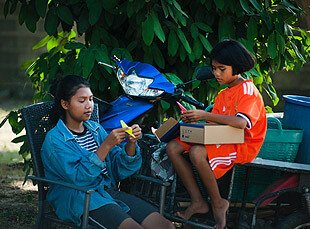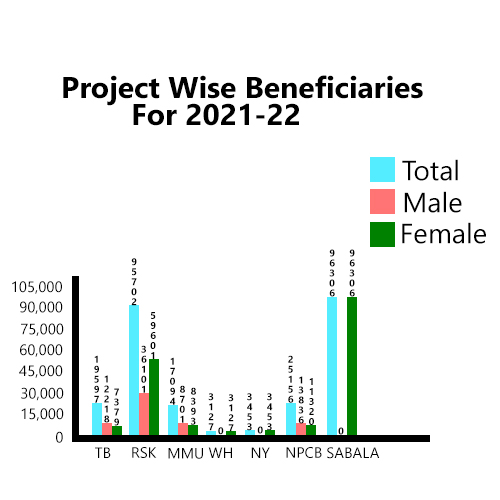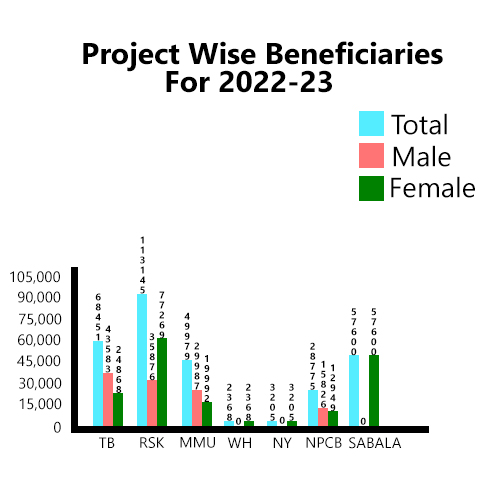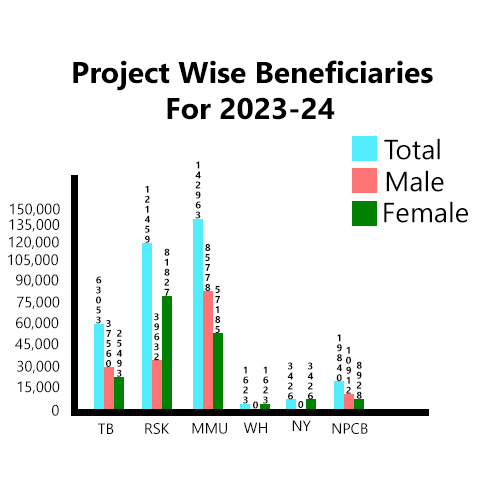
Mobile Medical Unit
Mobile Medical Unit
 The Mobile Medical Units (MMUs) initiative, implemented by AGMSWT under the National Health Mission (NHM), has been a pivotal strategy in expanding healthcare access, particularly for populations living in remote, difficult, under-served, and unreached areas. These MMUs operate under both the National Rural Health Mission (NRHM) and the National Urban Health Mission (NUHM), with the primary objective of bringing healthcare services to the doorstep of vulnerable communities rather than transferring patients to distant healthcare facilities.
The Mobile Medical Units (MMUs) initiative, implemented by AGMSWT under the National Health Mission (NHM), has been a pivotal strategy in expanding healthcare access, particularly for populations living in remote, difficult, under-served, and unreached areas. These MMUs operate under both the National Rural Health Mission (NRHM) and the National Urban Health Mission (NUHM), with the primary objective of bringing healthcare services to the doorstep of vulnerable communities rather than transferring patients to distant healthcare facilities.
The initiative aligns with NHM’s goal of ensuring universal healthcare coverage by offering services equivalent to a Primary Health Centre (PHC) through a structured package of essential healthcare services across seven thematic areas:
- Maternal Health
- Neonatal and Infant Health
- Child and Adolescent Health
- Reproductive Health and Contraceptive Services
- Management of Common Communicable Diseases & Basic OPD Care (Acute Simple Illnesses)
- Management of Mental Illness
- Management of Common Non-Communicable Diseases
These MMUs have played a transformative role in ensuring accessibility, affordability, and quality healthcare services for some of the most marginalized communities, ultimately contributing to improved public health outcomes and empowering individuals to take charge of their well-being.
Services
1. Reproductive and Child Health Services
- Antenatal Care (ANC) and Postnatal Care (PNC): MMUs provided essential maternal healthcare services, including regular check-ups, iron and folic acid supplementation, tetanus immunization, and counseling on safe delivery practices.
- Family Planning Services: Awareness campaigns and contraceptive distribution were conducted to ensure informed family planning choices.
- Management of Childhood Illnesses: MMUs treated common childhood diseases such as diarrhea and Acute Respiratory Infections (ARI), significantly reducing mortality and morbidity rates among children.
2. Curative Services for Common Ailments
- Treatment for minor ailments such as fever, cough, cold, skin infections, gastrointestinal disorders, and minor injuries.
- Immediate first aid and referral services for cases requiring further medical intervention at higher health facilities.
- Management of communicable diseases, ensuring timely detection and treatment to prevent the spread of infections.
3. Diagnostic Services
- Blood Tests: On-the-spot blood testing for common infections and conditions, enabling timely diagnosis and treatment.
- Urine and Stool Tests: Essential for diagnosing gastrointestinal infections and other health concerns.
- Malaria Smears: Early detection of malaria cases, particularly in high-risk regions.
- X-ray Services: Facilitating the identification of respiratory infections, fractures, and other medical conditions requiring further intervention.
4. Management of Non-Communicable Diseases (NCDs)
- Screening, diagnosis, and treatment support for hypertension, diabetes, and cardiovascular diseases.
- Counseling and lifestyle modification guidance to prevent long-term complications associated with chronic diseases.
5. Mental Health and Awareness Campaigns
- Mental health counseling services to address issues such as anxiety, depression, and stress, especially among vulnerable populations.
- Health awareness and education programs, including sessions on:
- Family planning and reproductive health.
- Hygiene and sanitation practices.
- Nutritional education and dietary guidelines.
- Preventive healthcare measures.
Impact of the MMU Initiative
1. Improved Accessibility to Healthcare - The MMUs successfully delivered healthcare services to hard-to-reach populations in rural and urban slum areas,
ensuring that even the most marginalized individuals—pregnant women, children, the elderly, and persons with disabilities—had access to medical care without needing to travel long distances.
2. Enhanced Maternal and Child Health Services - By providing antenatal care, postnatal care, and childhood disease management, the MMUs played a critical role in reducing maternal and infant mortality. Timely interventions ensured safer pregnancies and healthier childhoods.
3. Timely Diagnostic and Treatment Services - Early diagnosis and treatment of illnesses through on-the-spot medical tests and consultations reduced the burden of disease in communities, preventing the escalation of health conditions that could otherwise become life-threatening.
4. Reduction in the Strain on Higher Healthcare Facilities - By treating minor ailments and non-critical health issues at the community level, the MMUs prevented overcrowding in hospitals and secondary healthcare centers, allowing these facilities to focus on more serious cases.
5. Community Empowerment through Health Education - The MMUs functioned not only as medical service providers but also as platforms for health awareness and preventive care education. By empowering communities with knowledge on hygiene, nutrition, and reproductive health, the initiative contributed to sustained improvements in public health.
Geographical Coverage and Timeline
Phase 1: Implementation in Rural Areas (2015 – December 2021)
Since its inception in 2015, the MMU initiative was successfully implemented in the rural districts of Malda, Bankura, and Jhargram, ensuring healthcare access in some of the most underserved regions. The project continued for six years, significantly improving health indicators in these districts before reaching completion in December 2021.
Phase 2: Urban Slum Areas in Kolkata (August 2022 – February 3, 2024)
Recognizing the healthcare challenges faced by urban slum populations, AGMSWT expanded the MMU services to Kolkata Municipal Corporation (KMC) areas, focusing on slum-dwelling communities. The initiative covered:
- Boroughs 1, 2, 3, 4 – 12 slums
- Borough 7 – 48 slums
- Boroughs 11, 12 – 33 slums
- Boroughs 10, 16 – 12 slums
- Boroughs 15, 9 – 22 slums
Our Beneficiary

2021 To 2022 / Total Beneficiary

2022 To 2023 / Total Beneficiary

2023 To 2024 / Total Beneficiary
-
+858080Total Donations
-
+838580Projects Funded
-
+878580Happy People
-
+818580Our Volunteers
